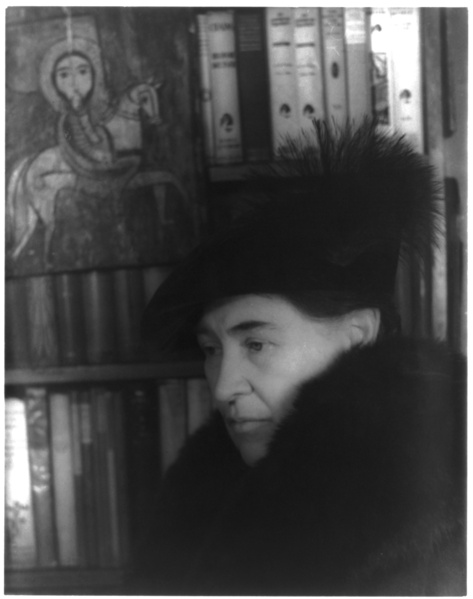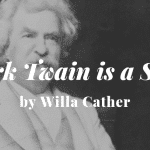
“THE AWAKENING.” Kate Chopin. $1.25. Chicago: H. S. Stone & Co. Pittsburg: J. R. Weldin & Co.
A Creole “Bovary” is this little novel of Miss Chopin’s. Not that the heroine is a creole exactly, or that Miss Chopin is a Flaubert—save the mark!—but the theme is similar to that which occupied Flaubert. There was, indeed, no need that a second “Madame Bovary” should be written, but an author’s choice of themes is frequently as inexplicable as his choice of a wife. It is governed by some innate temperamental bias that cannot be diagrammed. This is particularly so in women who write, and I shall not attempt to say why Miss Chopin has devoted so exquisite and sensitive, well-governed a style to so trite and sordid a theme. She writes much better than it is ever given to most people to write, and hers is a genuinely literary style; of no great elegance or solidity; but light, flexible, subtle and capable of producing telling effects directly and simply. The story she has to tell in the present instance is new neither in matter nor treatment. “Edna Pontellier,” a Kentucky girl, who, like “Emma Bovary,” had been in love with innumerable dream heroes before she was out of short skirts, married “Leonce Pontellier” as a sort of reaction from a vague and visionary passion for a tragedian whose unresponsive picture she used to kiss. She acquired the habit of liking her husband in time, and even of liking her children. Though we are not justified in presuming that she ever threw articles from her dressing table at them, as the charming “Emma” had a winsome habit of doing, we are told that “she would sometimes gather them passionately to her heart, she would sometimes forget them.” At a creole watering place, which is admirably and deftly sketched by Miss Chopin, “Edna” met “Robert Lebrun,” son of the landlady, who dreamed of a fortune awaiting him in Mexico while he occupied a petty clerical position in New Orleans. “Robert” made it his business to be agreeable to his mother’s boarders, and “Edna,” not being a creole, much against his wish and will, took him seriously. “Robert” went to Mexico but found that fortunes were no easier to make there than in New Orleans. He returns and does not even call to pay his respects to her. She encounters him at the home of a friend and takes him home with her. She wheedles him into staying for dinner, and we are told she sent the maid off “in search of some delicacy she had not thought of for herself, and she recommended great care in the dripping of the coffee and having the omelet done to a turn.”
Only a few pages back we were informed that the husband, “M. Pontellier,” had cold soup and burnt fish for his dinner. Such is life. The lover of course disappointed her, was a coward and ran away from his responsibilities before they began. He was afraid to begin a chapter with so serious and limited a woman. She remembered the sea where she had first met “Robert.” Perhaps from the same motive which threw “Anna Keraninna” under the engine wheels, she threw herself into the sea, swam until she was tired and then let go.
“She looked into the distance, and for a moment the old terror flamed up, then sank again. She heard her father’s voice, and her sister Margaret’s. She heard the barking of an old dog that was chained to the sycamore tree. The spurs of the cavalry officer clanged as he walked across the porch. There was a hum of bees, and the musky odor of pinks filled the air.”
“Edna Pontellier” and “Emma Bovary” are studies in the same feminine type; one a finished and complete portrayal, the other a hasty sketch, but the theme is essentially the same. Both women belong to a class, not large, but forever clamoring in our ears, that demands more romance out of life than God put into it. Mr. G. Barnard Shaw would say that they are the victims of the over-idealization of love. They are the spoil of the poets, the Iphigenias of sentiment. The unfortunate feature of their disease is that it attacks only women of brains, at least of rudimentary brains, but whose development is one-sided; women of strong and fine intuitions, but without the faculty of observation, comparison, reasoning about things. Probably, for emotional people, the most convenient thing about being able to think is that it occasionally gives them a rest from feeling. Now with women of the “Bovary” type, this relaxation and recreation is impossible. They are not critics of life, but, in the most personal sense, partakers of life. They receive impressions through the fancy. With them everything begins with fancy, and passions rise in the brain rather than in the blood, the poor, neglected, limited one-sided brain that might do so much better things than badgering itself into frantic endeavors to love. For these are the people who pay with their blood for the fine ideals of the poets, as Marie Delclasse paid for Dumas’ great creation, “Marguerite Gauthier.” These people really expect the passion of love to fill and gratify every need of life, whereas nature only intended that it should meet one of many demands. They insist upon making it stand for all the emotional pleasures of life and art, expecting an individual and self-limited passion to yield infinite variety, pleasure and distraction, to contribute to their lives what the arts and the pleasurable exercise of the intellect gives to less limited and less intense idealists. So this passion, when set up against Shakespeare, Balzac, Wagner, Raphael, fails them. They have staked everything on one hand, and they lose. They have driven the blood until it will drive no further, they have played their nerves up to the point where any relaxation short of absolute annihilation is impossible. Every idealist abuses his nerves, and every sentimentalist brutally abuses them. And in the end, the nerves get even. Nobody ever cheats them, really. Then “the awakening” comes. Sometimes it comes in the form of arsenic, as it came to “Emma Bovary,” sometimes it is carbolic acid taken covertly in the police station, a goal to which unbalanced idealism not infrequently leads. “Edna Pontellier,” fanciful and romantic to the last, chose the sea on a summer night and went down with the sound of her first lover’s spurs in her ears, and the scent of pinks about her. And next time I hope that Miss Chopin will devote that flexible, iridescent style of hers to a better cause.
Pittsburg Leader, July 8, 1899
- 100 Screenwriting Ideas to Get You Writing - January 20, 2026
- 100 Winter Storm Writing Prompts - January 17, 2026
- 100 Haunted House Story Starters: Craft Your Scariest Tale Yet - January 10, 2026



Hell, if I had been black I would be fairly pissed to listen to someone evaluate
a dizzy blond with a feather in their hair to twenty hooded
Klansmen murdering a household. And I’m fairly disgusted at the concept that the history of the Natives, and the historical past of the
blacks within the Reconstruction South, are being blended like we’re all the same individuals so it doesn’t matter which one will
get referenced.